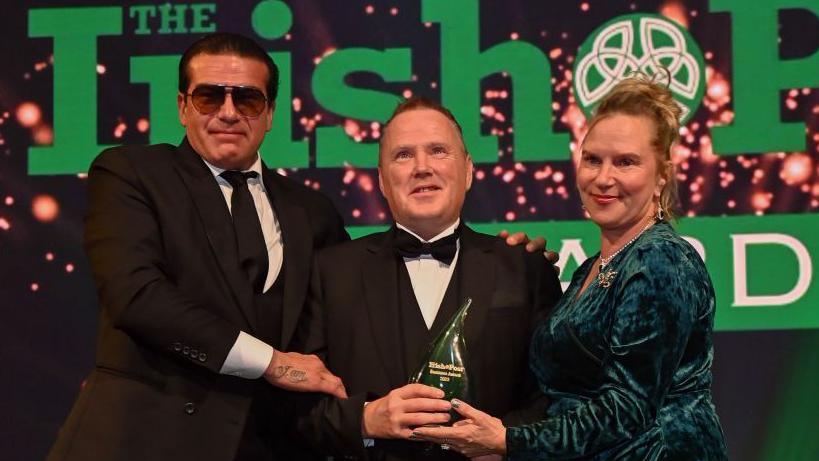'Blind golf gave me purpose' - meet the man who lost sight while asleep

Billy McAllister won the Inspiration in the Community Award at the 2023 Irish Post Awards
- Published
One morning in 2009, Billy McAllister's life changed forever.
Diabetic retinopathy meant his retinas had fallen off in his sleep and, in an instant, he had become totally blind.
On top of that trauma, three months later he had lost his job, his home and was in the middle of a divorce.
But now, more than 15 years on, McAllister is one of the top five best blind golfers in the world and is preparing for the British Blind Masters next month in Southampton.
"I didn't understand how to be a blind person," McAllister told BBC Radio Leicester.
"I was going through depression and I was 40 years of age at the time - 'what am I going to do for whatever left I've got in this world?'
"I had to relocate, I ended up getting divorced, I was homeless for a while – my two important things were: I need to be stimulated and I need to get back into employment.
"How does someone who is blind get into employment? Being disabled, it's really hard to get a job and I've mostly just worked in finance."
An avid Liverpool supporter, McAllister had been a season ticket holder at Anfield but said his blindness meant he had to give up going to matches.
"I lost all my credits because I couldn't go," he explained.
"So I thought, 'OK, football's my first passion but I always watched golf sighted' - I'd never played golf before though.
"As a blind person, I can see the logic and the feasibility in playing golf when the ball doesn't move.
"So, I thought it would probably be quite easy, not knowing the technicalities of golf, which I went on to find out how difficult it would be."
The Auld enemies combatting loneliness through sport
- Attribution
- Published25 September 2024
Blind, fundraising golfer refuses to be bunkered
- Attribution
- Published7 July
Blind golfer wins title with wife calling the shots
- Attribution
- Published22 August 2024
Introducing himself to the sport tentatively, McAllister began practising his swing with a broom stick.
The Northern Irishman then began to explore the possibility of playing.
"I'd been on the internet through the England and Wales Blind Golf Association [EAWBA], who were taking members on. I thought I'd have a go," he said.
McAllister, who was then living in Bedford, made his first steps by going to his local driving range.
"I wanted lessons on how to swing a club and I needed a guide while still coming to terms with sight loss, and everything else," he said.
"I was going to the golf club and just sitting there because I couldn't afford golf clubs, I couldn't afford golf lessons."
McAllister joined the EAWBA and was put in touch with Anders Mankert - a golf coach in Leicester.
"He's been fantastic," McAllister said.
"It's because of Anders, I've travelled the world playing blind golf for England - I've been to Japan, Australia and I played in the Blind Ryder Cup against the USA.
"I do a 300-mile round trip to go see Anders, as I now live in Hastings, to give me help with my game."
'Blind golf gave me a purpose'
Away from the course, McAllister's connection with EAWBA has helped give him the tools to live independently, including the ability to cook for himself.
"The whole thing has gone full circle. I'm full-time employed now and I got married last year to a wonderful woman I've never seen," he said.
"We've got our own house and I'm still playing blind golf.
"Primarily with everybody involved in blind golf, through the support and help I got, it gave me the chance to be fully stimulated and gave me a purpose to go and play a sport that able-bodied people can play."
There are three categories of blind golf, depending on the level of sight loss the golfer experiences.
McAllister, who is registered in the B1 category where participants have no light perception, or only have light perception that is not functional, has won the British Open, the Spanish Open, the Irish Open, the Order of Merit and represents the Rest of the World team against the USA.
Ahead of the British Masters next month, McAllister emphasised the importance of sighted volunteers to the blind players.
"I think the hardest thing about being a blind golfer is trying to get a guide," he said.
"It is one of the most inspirational sports but blind golf is very much a team – I can't do it without a guide.
"Trying to advertise for a guide is difficult because you're asking someone who doesn't know you to give up four hours once a week to guide you and find your ball.
"But when you go and win a British Open, which I've been fortunate enough to do, the guide is very much a part of that which, from the feedback I've got, is thoroughly enjoyed."